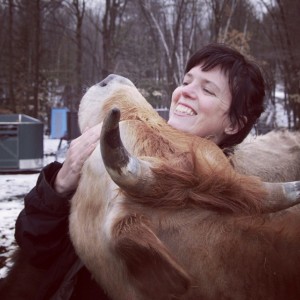 A popular and respected blogger in Québec, Canada, Élise Desaulniers is a food ethics and animal rights advocate who is also interested in public policy, philosophy, and feminism. In her new book Cash Cow: Ten Myths About the Dairy Industry, she takes a hard look at the dairy industry, and how it has persuaded the general public of the naturalness and value of cows milk in the human diet.
A popular and respected blogger in Québec, Canada, Élise Desaulniers is a food ethics and animal rights advocate who is also interested in public policy, philosophy, and feminism. In her new book Cash Cow: Ten Myths About the Dairy Industry, she takes a hard look at the dairy industry, and how it has persuaded the general public of the naturalness and value of cows milk in the human diet.
I recently had the opportunity to speak with Élise, and we talked about veganism, going dairy-free, and Cash Cow.
What motivated you to become vegan? Was it an overnight switch or more gradual shift?
Becoming vegan is probably the first – and the most radical thing I’ve done in my life. I had a “normal” life: a boyfriend, a good job, a nice apartment. I considered myself a foodie and I was proud of not being a picky eater. I ate everything and I was curious about eating everything. I also considered myself as an animal lover and an ecologist : I had cats I loved and was biking to the office every day. But I never made the link between my values and what I put in my mouth until that day.
It was 7 or 8 years ago. I was waiting for a friend in a cafe. He was late. I was looking for something to read and I had a few books in my bag. They were not my books. They were my boyfriend’s Amazon order I received at the office. He’s a philosopher, they were philosophy books he picked for an “introduction to ethics” class he would be teaching. They all seemed boring, but one caught my eye. It was a French introduction book on animal ethics. I started reading it wondering what would be the link between animals and ethics.
After a few pages, several concepts were already finding their way to make me feel bad about my food habits. Between humans and other animals, there’s a difference of degree, not of nature. How could I love my cats and eat pigs? How come I never thought about it before? And how does my pleasure eating meat justify the suffering of other animals? That night, I was already vegetarian. The following day, I made a huge Amazon order of books on food ethics and started googling to know more about the topic. The more I was reading, the more I was convinced I would never eat meat again. Problem is I didn’t know what to eat and a vegan friend helped me with my first grocery shopping and suggested some recipe books. The recipes she suggested were vegan, but I didn’t want to be a vegan. It seemed too extreme, too difficult. A few weeks later, I understood dairy and egg farming were as bad as animal husbandry and I realized being a vegan was not that difficult.
For the first few months, I was “cheating” in restaurants, while travelling and when I was invited over. I think knowing I could cheat helped me during my transition. I often say that becoming vegan is like learning a new language. And it takes a bit of time to get the full vocabulary.
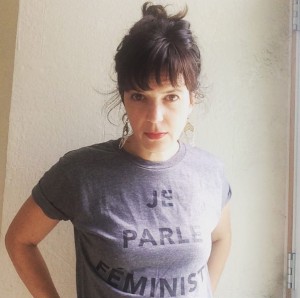 When people learn that you are vegan, what is the #1 question they ask and what is your response?
When people learn that you are vegan, what is the #1 question they ask and what is your response?
It changed over time. In the beginning, they were asking me a lot of questions related to health “what do you eat ?”, “where do you find your proteins ?”, “are you ok ?”. Now, maybe because a lot has been written about the health benefits of a plant-based diet or just maybe I’m associated with animal right issues, I get more questions linked to animal husbandry, such as “yes but what will happen with farmers if we all become vegan ?”. I was raised in Lanaudière, north-east of Montreal and when I was young, one of the main industry was tobacco: it was Quebec’s largest tobacco producer. All my friends were picking up tobacco during summers (I preferred strawberries). In the 90s, when the government started adopting anti-tobacco politics, those producers where screaming: “we made investments, there will be job loss…”. Well today, there’s no more tobacco in Lanaudière. Farmers have converted their land produce asparagus, fruits, wine. The economy is even better. World change. Demand change. And what we produce changes also. It will be the same for animal products in the next decades.
I also get a lot of questions on the environmental impact of milk production. Let’s say it’s the #2 question. Since milk is produced locally, it has this “eco-friendly” aura. People don’t know that the water production footprint of one liter of cow’s milk is more than three times that of soymilk and it requires a lot more energy to produce cow’s milk than soy milk.
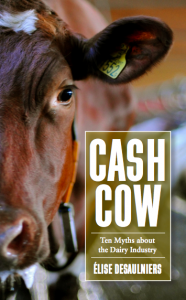 Tell me a little bit about your book Cash Cow and what inspired you write it.
Tell me a little bit about your book Cash Cow and what inspired you write it.
Since the publication of my first book on food ethics, I’ve been talking a lot about the treatment of animals, marine life, and the environmental consequences of raising livestock. More often than not, people have agreed with me. Several readers have written to tell me that I have inspired them to eat less meat. But I soon realized that when it comes to cheese and yoghurt, it’s different. Dairy products are held dear. I wanted to understand this emotional attachment to dairy. It’s fine to be vegetarian but adopting a vegan diet seems a little extreme. We all know milk comes from cows and these cows are often raised in horrible conditions and slaughtered after a few years. The reality is not different than animals raised for meat, but our perception is different. I wanted to understand where it comes from and why are we so scared to challenge our relationship with dairy.
Why do you think people believe the myths about dairy?
It’s a good question! We’re both emotionally and rationally attached to milk, more than to any other food I think. This is the biggest victory of the dairy industry who has been investing a huge amount of money in the past century to convince us it’s natural and necessary to drink cow’s milk. During my research for Cash Cow, I discovered how powerful the dairy lobby is. The industry is funding research aimed at convincing us of the necessity and advantages of drinking milk and at the same time, builds our emotional attachment to it with powerful images. Millions of dollars are spent on advertising campaigns that monopolize television airwaves and newspaper space. Very intelligent people are hired to think about the best ways to gain our sympathy,
But why are our beliefs so enduring, even after we see that they may be false? In Cash Cow, I show how we are more receptive to arguments that confirm our beliefs than the ones that challenge them, and we are very good at justifying our inconsistencies and believing what suits us best. Data also shows that our brain might be more comfortable with intuitions and emotions than with sound research based on hard evidence. Beliefs also bring people together. One of the reasons why I found it difficult to wean myself off my own false beliefs about milk. Doing so somehow made me a traitor to my Quebecois identity and the community I belonged to.
Do you have any insight as to why people will give up meat but refuse to cut back on cheese and yogurt?
Basically, because cheese and yoghurt taste good. It’s fat, it’s sugar. We crave that. But there are two other reasons I give in the book.
The first one is historical. Cow’s milk has long been a reason for being vegetarian, not vegan. Since Antiquity, proponents of vegetarianism have emphasized the services that cows perform for us so as to better highlight the cruelty of those who put them to death. The milk we get from the cows should compel us to respect them, not eat them. Until recently a human society without cows was not even a utopia— it was something nobody had thought of! The only possible solution, the best we could offer animals, was vegetarianism, and treating them with respect.
I also suggest that when we’re about to consume dairy products, even if we know it has been produced under unacceptable conditions, we can still tell ourselves that it could have been produced without any suffering. This is, of course, a very bad argument. But this mere possibility might be enough for us to stop feeling guilty. It works especially well with dairy products because they are not directly related to the flesh—they don’t directly involve death.
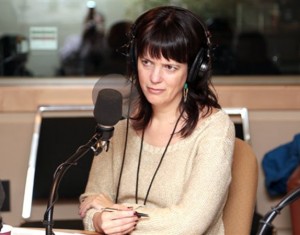 My own health improved greatly when I ditched dairy products. Did you notice any changes in yourself when you gave up milk?
My own health improved greatly when I ditched dairy products. Did you notice any changes in yourself when you gave up milk?
Since I quickly became vegan after becoming vegetarian, it’s hard for me to separate the health effects of ditching dairy products from other animal products. I also eat better. But I have to admit I feel younger than I was 8 years ago: I have more energy, nicer skin, I don’t need to sleep as much. My blood analysis are also better. I have less cholesterol and more iron.
When I was a kid, I was drinking more than 1 liter of milk every day. I was also suffering from chronic ear infections. Today, I realize the two were probably linked. I hope moms and dads with sick kids will read my book and try to cut down on dairy to see if there’s an improvement. It hurts so much!
Oh, and becoming vegan and thinking about animal rights issues turned me into a feminist activist. I now see the parallels between the systematic oppression of animals and women. But it’s not related to health 🙂
What advice would you give to someone who wants to go vegan but doesn’t know where to start?
I don’t think there’s one method that fits everybody, but data shows that for most of us, gradual changes work better. First, you can try to be vegan at home. Don’t buy animals products at the grocery store. Following programs such as the “21 days vegan challenge” from the PCRM seems to give good results. Participants discover new recipes while getting support and answer to their questions. The most important is maybe that they don’t feel alone. It’s so easy to feel isolated in a meat eating world. Beyond the recipes and health tips (take your B12!), emotional support is crucial. When starting to witness violence towards other animals, one might feel powerless. It is also often difficult to deal with the comments and remarks from our loved ones. It’s so much easier to go through all of that when surrounded by people that understand what we live.
What replacements for dairy-products do you recommend?
I like to say that since we don’t need dairy products, there’s no need to replace them. But preparing dinner without dairy products can be challenging. I use different non-dairy milks in my cereal, coffee and cakes. I always have a package of Daiya or Tofutti in my fridge for grilled cheeses. I also have soy or rice cream for sauces. When I travel, I like to taste the local nut cheeses. So far, my favourites are Miyoko’s, Dr. Cow and Veg Nature (it’s from Quebec city) but there are new brands emerging every day and I can’t wait to try them! I have friends that are better cooks than I am that make amazing whipped cream with coconut milk and their home-made cheeses. I wish they would invite me over more often.
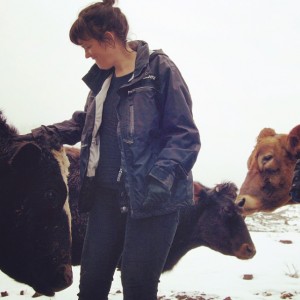 Who are your heros in the animal rights world?
Who are your heros in the animal rights world?
The real heroes are those who spend time explaining to their friends, families and coworkers why we should care about animals. Those who spend their evening on Facebook giving tips to new vegans or their weekends publishing their receipts or reflections on animal rights issues. They are also those who distribute leaflets or take part in public demonstrations or organize events and festivals. This being said, I’ve recently discovered the eco-feminist movement and I admire and learned a lot from writers and activists such as Carol J. Adams, Pattrice Jones and Lori Gruen to name just a few. I also admire the work of A. Breeze Harper who works on diversities issues linked to veganism.
Where do you see vegan movement heading? Will we have a vegan-leaning world in 10 years?
I wish I had the answer! To lean toward a vegan world, we need to think about veganism in a global perspective. I’m very proud of the preface of Cash Cow where Mia MacDonald, the executive director and founder of Brighter Green explains how China, India, and several countries in Southeast Asia are receiving attention and investment from international and domestic dairy producers. For instance, in China, domestic production of milk is expected to triple by 2030. I recently had a chat with a group of young Chinese who told me that they’ve been told all their life to drink milk to grow tall. Being tall is an obsession for Chinese since there is a lot of discrimination against shorter people.
I’m afraid that emerging countries will become the new Cash Cow of the dairy and meat industry, just like the tobacco industry turned to those new markets when Occident started to turn its back on the cigarette. I first wrote Cash Cow for the Quebec market. But the more I read and think about the animal rights issues, I realize it’s a global challenge. Of course, we have to act locally in our communities to educate, make vegan alternatives available and increase the legal protection of animals. But we also have to bring our activism to another level by discussing and sharing strategies with our colleagues in other countries and continents. Having this conversation is a good start!
Alley photo by Nathalie Turbide
Radio photo by Radio-Canada/Michel Harvey
